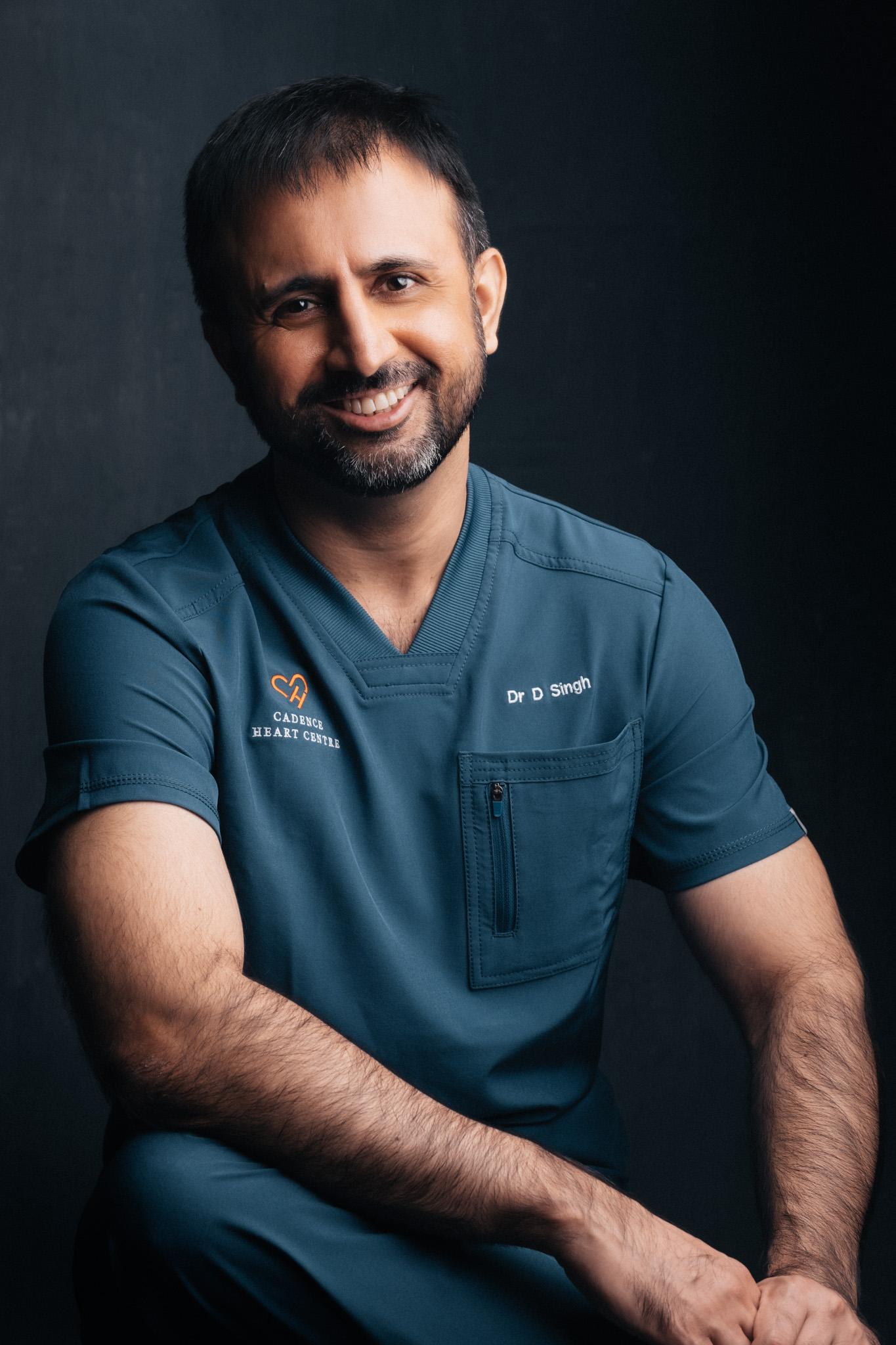Medical Care , News & Innovation , Cardiology (Heart)
What is Atrial Fibrillation?
Atrial fibrillation (AF) is a heart rhythm disorder where the upper chambers of the heart emit uncoordinated electrical signals, causing irregular or rapid heartbeats.

When the heart is healthy, the upper chambers of the heart (the atria) beat in synchrony with the lower chambers of the heart (the ventricles). However, in a heart affected by atrial fibrillation, the atria beat chaotically or irregularly, becoming out of sync with the ventricles of the heart. This often results in symptoms like weakness, difficulty breathing, or heart palpitations. Patients often feel that their heartbeats are all over the place. However, Atrial fibrillation can also present with no symptoms at all.
This lack of visible symptoms is particularly dangerous because AF is known to increase one's likelihood of stroke when left untreated. In fact, about 15-20% of stroke patients have this condition, and patients with AF are 5 times more likely to suffer from a stroke. Other risks associated with AF are heart failure and other heart-related complications.
How Does Atrial Fibrillation Cause Stroke?
During rapid and irregular contraction of the heart, there is stagnation of blood in the cardiac chambers due to ineffective contraction leading to clot formation in the heart chamber, especially the left atrium. A stroke will occur if any of these clots are dislodged and travel into the brain.
How Can I Prevent Strokes if I Have Atrial Fibrillation?
Several factors affect one’s risk of developing a blood clot and having a stroke, which can be calculated using a set of questions asked by your cardiologist. This also helps them determine the best course of treatment for your condition. Often, patients are prescribed medication to prevent blood clots from forming. These are called anticoagulants.
Anticoagulants, commonly known as blood thinners, lower the risk of a blood clot which, in turn, reduces one’s likelihood of stroke. Although people refer to anticoagulation as “thinning the blood”, this medication does not actually make the blood any thinner but prolongs the time it takes for a blood clot to form.
Blood thinners help 2 in every 3 patients reduce their risk of stroke. This means that anticoagulant treatment prevents about 60% of strokes that could have occurred in people with AF.
Should you take medicine to reduce your risk of stroke?
Certain risk stratification models can be carried out by your cardiologist to assess your risk of stroke and determine whether to administer medication to reduce that risk. A common assessment tool is the CHA2DS2-VASc risk, which takes into account your current and past medical history. Points are added as follows:
- Recently worsened congestive heart failure (1 point)
- Hypertension - past or present (1 point)
- Aged 65 - 74 years old (1 point)
- Aged 75 years or older (2 points)
- Diabetes (1 point)
- A medical history of stroke or transient ischemic attack (TIA) (2 points)
- Vascular disease (1 point)
- Female (1 point), Male (0 points)
The higher the total points scored, the higher the risk of stroke. Generally, patients with a risk score of 2 and above will be prescribed anticoagulation medication. Men with a risk score of 1 may be offered the anticoagulants, whereas women with the same risk score may not. This is because the benefits of the treatment outweigh the risk.
Other risk assessments are the:
- HAS-BLEED score, which estimates a patient’s risk of major bleeding as a complication of the medication used to reduce the risk of stroke for AF. This helps your cardiologist determine whether steps should be taken to reduce your risk of bleeding should you take anticoagulation medication.
- ORBIT score, which helps assess your risk of major bleeding, including bleeding in the brain.
Risk assessment tests like these help your cardiologist determine whether anticoagulation medication would be a beneficial treatment option to reduce your risk of stroke. For most people, the benefits outweigh the risks. However, if your risk is high and cannot be reduced, your cardiologist will discuss the pros and cons of starting (or stopping) anticoagulation.
Which medicines help reduce the risk of stroke?
Aspirin is effective at lowering your risk of a second stroke if you had previously suffered from a stroke that was not caused by atrial fibrillation. However, in AF-related stroke, aspirin may not be as effective and is just as likely to cause complications. This is why aspirin is no longer recommended to reduce the risk of stroke in AF.
In place of this, your cardiologist is likely to recommend an anticoagulant. Warfarin was the traditional option. However, several newer medications - direct-acting oral anticoagulants (DOACs) - are now available. These are:
- Dabigatran
- Apixaban
- Rivaroxaban
- Edoxaban
Studies have shown the DOACs to be at least as effective as warfarin for reducing the risk of an AF-related stroke. In addition, they:
- Have a lower risk of causing major bleeding in the brain.
- Require less frequent blood monitoring (you do not need regular INR blood clotting tests).
- Have lesser contraindications with other medication or food that may lead to bleeding or clotting.
- Do not require frequent adjustments in dosage based on your blood results, unlike warfarin.
Left Atrial Appendage Occlusion Procedure
An operation can also be performed to reduce the risk of stroke for people with atrial fibrillation called a left atrial appendage occlusion (LAAO) procedure. This is an alternative solution for patients who cannot take medication for stroke prevention. In this procedure, your left atrial appendage, a small pouch in the left atrium of your heart, is closed up to prevent blood from pooling in that section of the heart, hence, lowering your risk of stroke.
Atrial fibrillation is undoubtedly a serious condition that puts you at risk for serious complications, such as stroke. However, measures can be taken to help diagnose, manage and lower your risk. As such, it is important that you seek immediate medical treatment should you experience symptoms of AF. With early diagnosis and proper management, you can keep your condition under control and avoid complications.
About Dr. Devinder Singh
Dr Devinder Singh is the Medical Director and Senior Consultant Cardiologist & Cardiac Electrophysiologist at Cadence Heart Centre, with over two decades of clinical experience.
Dr Singh’s speciality lies in diagnosing and treating a wide range of cardiovascular conditions, with expertise in managing heart rhythm disorders. He has extensive experience in treating complex cardiac arrhythmias, such as atrial fibrillation and ventricular tachycardia. He is also the only cardiologist in Singapore with a dual-subspecialty in cardiac electrophysiology and cardiac magnetic resonance imaging.
Doctors

Related Articles
Medical Care
Blood delivery drone due to become world’s fastest
New-generation drones slash delivery time of life-saving blood products and medicines in hard-to-reach areas in Rwanda
Read moreMedical Care
Better use your nose
In the long term, mouth breathing might lead to several complications
Read moreMedical Care
Better sleep can improve sex
Experts say that better sleep and better sex are linked
Read moreLatest Articles
Medical Care
Clinical Exercise Physiologist (CEP): The Emerging of Exercise is Medicine
How Exercising can be a Medicine
Read moreMedical Care
Reversing type 2 Diabetes: Embracing Hope and Determination
Experience the remarkable journey of Ash and his grandfather Atok as they conquer type 2 diabetes through unconventional methods, showcasing the power of love and determination over adversity.
Read moreMedical Care
Bladder Cancer: What You Need to Know
Empower yourself with our comprehensive guide to bladder cancer. Explore symptoms, diagnosis, treatments, and supportive resources to safeguard your health.
Read more